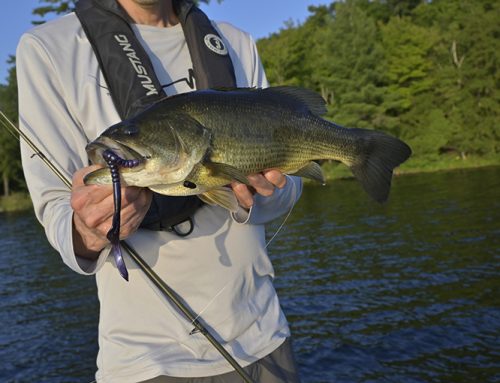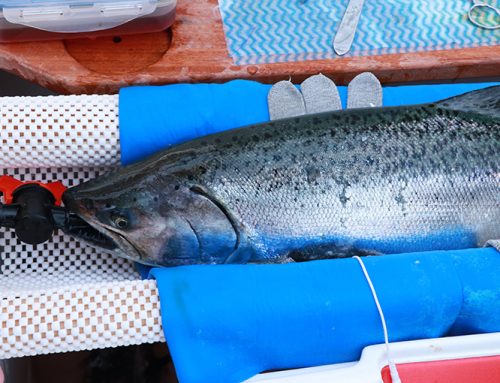 We all love to hear granddad’s tales of fishing “old style.”
We all love to hear granddad’s tales of fishing “old style.”
Stories of digging up worms, fastening a rod from a nearby sapling, and tying a safety pin to an old shoelace make for fine entertainment, but seem far removed from the way we fish today.
And what does the future hold? Can fishing be even more effective than it already is?
Recently I attended a non-fishing related conference that focused on changes Toyota has brought to the automotive industry.
The Japanese auto builder took Henry Ford’s process of mass automobile production and eliminated much of the waste associated with it.
In doing this, they created what is called a “lean” system of production, which in simplest terms is a systematic method of constantly reducing or eliminating waste.
As I sat in the conference room learning about this new methodology, I drifted off into a hypnagogic state, with dreams of fishing slowly creeping into my mind.
I heard the presenters using words like “kaizen,” “gemba,” “hansei,” and “genchi genbutsu” and I started thinking about how I could take these production-line improvements over to my fishing line.
Let’s take a look at these terms and how they can help anglers become more proficient.
Muda:
Muda is a Japanese word meaning uselessness, idleness, waste, wastage, or wastefulness.
I don’t know of an angler who isn’t guilty of some sort of waste throughout the course of a day on the water.
Whether it’s wasted time, effort, energy, space, or even money.
The goal of lean is to reduce as much of that waste or “muda” as possible and maximize output and efficiency.
Gemba:
This means “at the site” or “where the work happens.” Gemba for anglers would refer to being at the water.
But Gemba could also mean spending time pre-rigging rods with baits and presentations that you will use the next day.
Pre-rigging rods eliminates wasted time and energy when you’re actually on the water.
Genchi Genbutsu:
This means “go see.” It is a key principle of a lean operation. It suggests that in order to truly understand a situation, one needs to go to the “gemba.”
To an angler, this means no matter how many reports you’ve read, or how many informational videos you’ve watched, you still need to “genchi genbutsu” and practise, practise, practise to put these lean processes in motion.
Another great way to look at genchi genbutsu is to constantly explore new areas on the lake.
Don’t just go to the same ole’ honey hole you visit every time you’re on your favourite lake. I promise if you look, you’ll find other spots just as good, if not better.
Don’t just go to the same ole’ honey hole you visit every time you’re on your favourite lake. I promise if you look, you’ll find other spots just as good, if not better.
Kaizen:
This means “change for better.” It is a Japanese philosophy of continuous improvement of working practices, personal efficiency, and problem solving.
This one was simple to convert to angling terms. As anglers we’re constantly performing “kaizens,” by problem-solving and finding better ways to catch fish.
Let’s say you are moving down the lake with a spinnerbait and you start catching fish, but shortly thereafter the bite slows down.
Some anglers would leave, thinking they’ve caught all the fish in the area, or that the remainder are inactive and won’t bite.
The kaizen way of thinking would be, is there a better way to catch these fish?
Hansei:
It means to acknowledge your own mistake and to pledge improvement.
C’mon we all know that no one is perfect. We all make mistakes. Why not learn from them?
Mistakes can include forgetting to check your line for nicks, not retying a knot properly, or setting the hook too hard or not hard enough.
A major mistake I often make is not paying enough attention to Mother Nature. Having the proper layers with you to correctly battle the elements (wind, rain, cold) is key to all types of muda.
If you’re too busy thinking about the weather to fish comfortably, you’re not able to listen and think about what the lake and fish are trying to tell you.
If you’re too busy thinking about the weather to fish comfortably, you’re not able to listen and think about what the lake and fish are trying to tell you.
Acknowledging these mistakes and making a mental note to work on them will make you a more competent angler.
As you see, a great idea can be transferrable to many more aspects of life than the one it was intended for. Taking Toyota’s lean approach to the water will help you maximize your fishing time, and ultimately, catch more fish.
James Hill is an avid angler from northwestern Ontario.






Leave A Comment